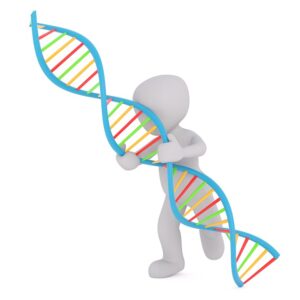
This article looks at epigenetics, physiological and psychological inheritance and why they matter to a family historian.
Epigenetics explains the interaction between nature (our genes) and nurture (our environment).[i]
It’s the study of how external forces, such as our environment and life experiences, trigger on-off mechanisms in our genes. It is involved in every aspect of life. The idea that an individual’s experience might alter the cells and behaviour of their children and grandchildren is now widely accepted.[ii] So such experiences can be of great interest to the family historian.
Physiological effects are those to do with the human body. The psychological relates to the mind and emotion.
Why do physiological & psychological inheritance matter?
Physiological and psychological trauma can affect not only the person involved but succeeding generations. Therefore, ancestral trauma can influence and shape a descendant who has no knowledge of it. This has implications for family historians wanting a deep understanding of their forebears. It can also be critical to living relatives struggling with mental health issues.
How can we unpick cause and effect?
This is a challenge for researchers. Many of the human studies are necessarily small. However, there are some larger groups of people being studied that may provide meaningful evidence.
Physician and neuroscientist Ali Jawaid studies children living in the SOS Children’s Villages orphanages in Multan, Lahore, and Islamabad in Pakistan. The University of Zurich says the orphanages provide the best possible shelter, health care and sends youngsters to school, ‘But despite that, these children experience symptoms similar to PTSD [post-traumatic stress disorder],’ as well as anxiety and depression.
Ground-breaking international research has uncovered a common set of genes that increase the risk for heritable conditions such as ADHD, autism spectrum disorder, bipolar disorder, major depression and schizophrenia. The study’s lead author Dr Anke Hammerschlag said, ‘Our findings are an important first step towards the development of new drugs which may be effective for a wide range of patients, regardless of their exact diagnosis’.[iii]
Although we should always view revolutionary research with caution, new ‘knowledge [should] bring us closer to the development of more effective personalised medicine.’[iv]
Epigenetics: not limited to a psychological impact
Jawaid is also studying the disturbing possibility that the emotional trauma of separation from their parents also triggers subtle biological alterations ‘changes so lasting that the children might even pass them to their own offspring’.[v]
Have you noticed repeated health conditions in your family?
In a recent study conducted at Northwestern University, Dr Thomas McDade led a team of scientists intent on discovering the effect that poverty can have on a person’s genome. (A genome is an organism’s complete set of DNA, including all of its genes.)
McDade’s team found that living in poverty can leave a person susceptible to insulin resistance, chronic inflammation, problems with the immune system, skeletal growth, and the nervous system.[vi]
Hope
Thankfully, professor of psychology explains that DNA does not dictate our fate but shows that epigenetic effects can also be reversed through lived experiences.[vii]
Professor Isabelle Mansuy of the University Zürich suggests life experience can be healing as well as hurtful at the molecular level:
Environmental enrichment, at the right time, could eventually help correct some of the alterations which are induced by trauma.[viii]
If so, the possibility of understanding which positive experiences are needed for better outcomes for our children and grandchildren is an optimistic and exciting one.
The next article Dissociation in our Family Tree is here.

About A Victorian’s Inheritance
Anxiety. Addiction. Depression.
We associate these words with the challenges of modern life.
Rarely do we consider how these conditions shaped past generations.
Using archival sources, testimonies, and her grandfather Walter Parker’s experiences, the author not only paints a vivid picture of life in an English Victorian village. She also draws upon psychological theory to explore the lives of her working-class ancestors.
What did your forebears inherit from their parents?
Which psychological characteristics did your ancestors hand down?
A Victorian’s Inheritance can help you find answers.
To read some of A Victorian’s Inheritance go here and click on Your first two chapters are waiting (at the bottom of the page).
Who Do I Think You Were? A Victorian’s Inheritance by Helen Parker-Drabble is an accessible exploration of the life, times and psychological inheritance of Walter Parker, a Victorian working-class youth growing up at the Tank Yard in the English village of Thorney, on the 11th Duke of Bedford’s forgotten estate.
This is not the story of just one man, but of an era. The information and theories introduced in this book can help connect us to our ancestors. They can inspire us to be more mindful of the psychological legacy we leave behind.
About the Author
Helen Parker-Drabble is a counsellor by profession and a genealogist and family historian by experience. According to the online Cambridge dictionary, one of the definitions of therapy is it is a ‘treatment that helps someone feel better or grow stronger’. So as a geneatherapist, I aim to explore mental health, mental illness, and psychology through different eras, in the hope that by exploring what impacted our ancestors we help the present generation.
Helen is also a life-long explorer of social history and weaver of factual family tales, with a Diploma in counselling. Fascinated by psychological theory and the stories we develop to make sense of ourselves and our family, Helen’s original quest was to understand her Victorian grandfather, Walter Parker, born in 1885 in Upwell on the Norfolk/Cambridgeshire border.
Family history doesn’t survive unless it’s in print, which is why Helen set out to write an engaging and accessible biography that would not only explore working-class Victorian life in an English village but could motivate and encourage other family historians struggling to pass on what they have painstakingly discovered. The result, in part, is an exploration of transgenerational legacy of loss, trauma, anxiety and depression.
Endnotes
[i] Erick, T. of Brown University (2014). Epigenetics: How Nurture Shapes Our Nature. [online] Footnote SHOWCASING RESEARCH WITH THE POWER TO CHANGE OUR WORLD. Available at: http://footnote.co/epigenetics-reveals-how-environment-shapes-gene-expression/ [Accessed 24 Jul. 2019].
[ii] Curry, A. (2019). Parents’ emotional trauma may change their children’s biology. Studies in mice show how. Science.
[online]
Available at: https://www.sciencemag.org/news/2019/07/parents-emotional-trauma-may-change-their-children-s-biology-studies-mice-show-how [Accessed 23 Jul. 2019].
[iii] Hammerschlag, A., de Leeuw, C., Middeldorp, C. and Polderman, T. (2019). Synaptic and brain-expressed gene sets relate to the shared genetic risk across five psychiatric disorders. Psychological Medicine,
[online]
pp.1-11. Available at: http://www.cambridge.org [Accessed 26 Jul. 2019].
[iv] Hammerschlag, A., de Leeuw, C., Middeldorp, C. and Polderman, T. (2019). Synaptic and brain-expressed gene sets relate to the shared genetic risk across five psychiatric disorders. Psychological Medicine,
[online]
pp.1-11. Available at: http://www.cambridge.org [Accessed 26 Jul. 2019].
[v] Curry, A. (2019). Parents’ emotional trauma may change their children’s biology. Studies in mice show how. Science.
[online]
Available at: https://www.sciencemag.org/news/2019/07/parents-emotional-trauma-may-change-their-children-s-biology-studies-mice-show-how [Accessed 23 Jul. 2019].
[vi] Hilary Hurd Anyaso, Northwestern Now, Poverty leaves a mark on our genes Northwestern University, April 05, 2019.
[vii] Moore, D. (2017). The Developing Genome: An Introduction To Behavioral Epigenetics. 1st ed. Oxford University Press.
[viii] Curry, A. (2019). Parents’ emotional trauma may change their children’s biology. Studies in mice show how. Science.
[online]
Available at: https://www.sciencemag.org/news/2019/07/parents-emotional-trauma-may-change-their-children-s-biology-studies-mice-show-how [Accessed 23 Jul. 2019].
